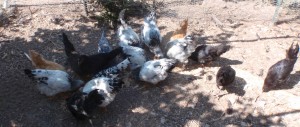All my concerns about hawks hunting my chickens have recently been confirmed. Twice recently, the now about 3/4 grown chickies have been out and a hawk has been seen hunting directly overhead. Both times, I was the only one immediately available to try to herd the chickens to safety. In the moment of urgency, I circled around behind them and began a medium-light, syncopated clapping.
One could say that it was similar to a mother hen clucking to get her chicks’ attention. Right away, most of the chickens ran for the coop. I had to work a little harder to insist that the ones under the grape vines get moving. I can’t just leave them there, because I have to close the gate of the smaller enclosed pen and then they would be left out of the fold as fox or skunk bait! Still, it was only a couple of minutes before they, too, had made it to home base.
A couple of them stopped near the coop, side tracked by green foliage, but a few more claps and they “obeyed.” The whole process probably took 3 minutes in a fenced pen that is approximately 72 x 24 feet. It involves obstacles like wild rose bushes, abandoned metal pasture gates, as well as a mine field of large holes and piles from various diggings in the dirt. Most of the chickens were the maximum distance away from the enclosed pen when I started.
I’m sure this successful herding is only possible because I have been herding them regularly, even if it hasn’t been the exact same method. They seem to know that that type of noise means “head for the coop.” Basic training that has been the difference between life and death for them. I definitely recommend a regular herding routine for any open range chickens!
Extra note on normal daily herding: I take grain with me when I go to let the chickens out to forage for a while, but I set the container of it where they can’t reach it. Otherwise, many of them tend to stay in the enclosed pen. Then, when I am close to the time of herding them back, I spread the grain in the enclosed pen. They find it when they are herded in, which keeps them occupied, and less likely to leave again, while I get the rest of the flock to quarters.

